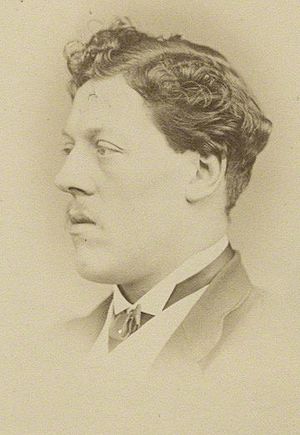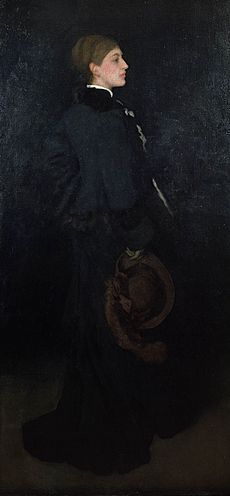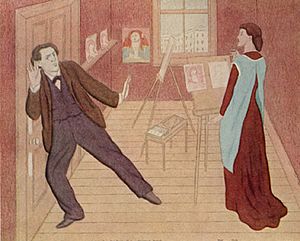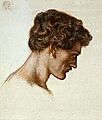Charles Augustus Howell facts for kids
Quick facts for kids
Charles Augustus Howell
|
|
|---|---|

Photograph of Howell by Elliott & Fry, 1860s
|
|
| Born | 10 March 1840 Porto, Portugal
|
| Died | 21 April 1890 (aged 50) Chelsea, London, England
|
| Occupation | Art dealer |
Charles Augustus Howell (born March 10, 1840 – died April 21, 1890) was a well-known art dealer in Victorian England. He was famous for his connections with many important artists and writers of his time. People knew him for his charming personality and his ability to get things done. He is especially remembered for helping the poet Dante Gabriel Rossetti retrieve some poems. Howell's interesting life even inspired a character in a Sherlock Holmes story.
Contents
Who Was Charles Augustus Howell?
Charles Augustus Howell was born in Porto, Portugal. His father was English, and his mother was Portuguese. He often said he came from a noble Portuguese family. He even wore a special red ribbon from the Portuguese Order of Christ, claiming it was a family honor. Howell moved to Britain when he was young.
In 1858, Howell left Britain for a short time. This happened just before a friend of his tried to harm Napoleon III, the French emperor. Because of this, some people wondered if Howell was involved in the plan. He returned to Britain in 1864.
Howell's Work with Famous Artists
Howell became a close friend and business helper to two very famous people: the artist Dante Gabriel Rossetti and the writer John Ruskin.
Working with John Ruskin
From 1865 to 1868, Ruskin hired Howell as his secretary. Ruskin trusted Howell with important tasks that needed careful handling. This often meant managing Ruskin's secret donations to help people. However, Howell also tried to gain more control over Ruskin's money. Eventually, another artist, Edward Burne-Jones, convinced Ruskin to end his working relationship with Howell.
Helping Dante Gabriel Rossetti
Rossetti's brother, William Michael Rossetti, said that Howell was a great salesman. He had an open and friendly way of speaking. He was also very good at telling amusing stories. Howell was skilled at understanding what people liked and what their weaknesses were. This helped him get many art jobs for Rossetti.
One of the most famous things Howell did for Rossetti was to help him get back some poems. Rossetti had placed these poems in his wife Elizabeth Siddal's coffin when she died in 1869. Howell was able to arrange this because he knew the government official in charge at the time. Rossetti wanted this event to be kept a complete secret.
Advising Algernon Swinburne
Howell also gave business advice to the writer Algernon Swinburne. Some letters that Swinburne wrote to Howell later ended up with a publisher named George Redway. Redway used these letters to pressure Swinburne about the rights to one of his poems.

Howell's friendship with the Rossetti family ended after a disagreement. It was said that he convinced Rosa Corder to create fake drawings that looked like Rossetti's work. In 1883, Rosa Corder had a daughter with Howell, and they named her Beatrice Ellen Howell.
In the late 1880s, Howell joined a group called the Order of the White Rose. This was a society interested in the history of the Jacobite movement. The artist James Abbott McNeill Whistler also joined this group.
Howell's Death
Howell died in 1890. There are different stories about how he died. Some reports say he was found dead, while others say he died in the hospital. Many letters from important people were found at his home. These letters were neatly organized, which led to a lot of talk and guesses about his life.
How People Remembered Howell

Many rumors spread about Howell's honesty and his dealings with people. Some thought he used the letters he had to pressure important individuals. His friends in the art world had different opinions about him.
Edward Burne-Jones described Howell as "a bad, dishonest, and mean person." Hall Caine called him a "soldier of fortune," meaning someone who seeks wealth through adventure. Algernon Charles Swinburne said he was "the worst person I ever met."
However, other artists had kinder things to say. Ford Madox Brown admitted Howell was "one of the biggest liars," but also said he was "good natured." Whistler called him a "wonderful man" and "splendidly flamboyant."
Later writers who studied the Pre-Raphaelite artists suggested that Howell might have used letters to pressure his former friends in his later years. But his biographer, Helen Rossetti Angeli, could not find strong evidence to prove these claims. It's possible these stories grew from the incident involving George Redway and Swinburne's letters.
Howell's character also inspired fictional stories. Besides the Sherlock Holmes story "The Adventure of Charles Augustus Milverton", he was also the basis for a character named De Castro in Theodore Watts-Dunton's novel Aylwin.
Images for kids
 | Chris Smalls |
 | Fred Hampton |
 | Ralph Abernathy |


